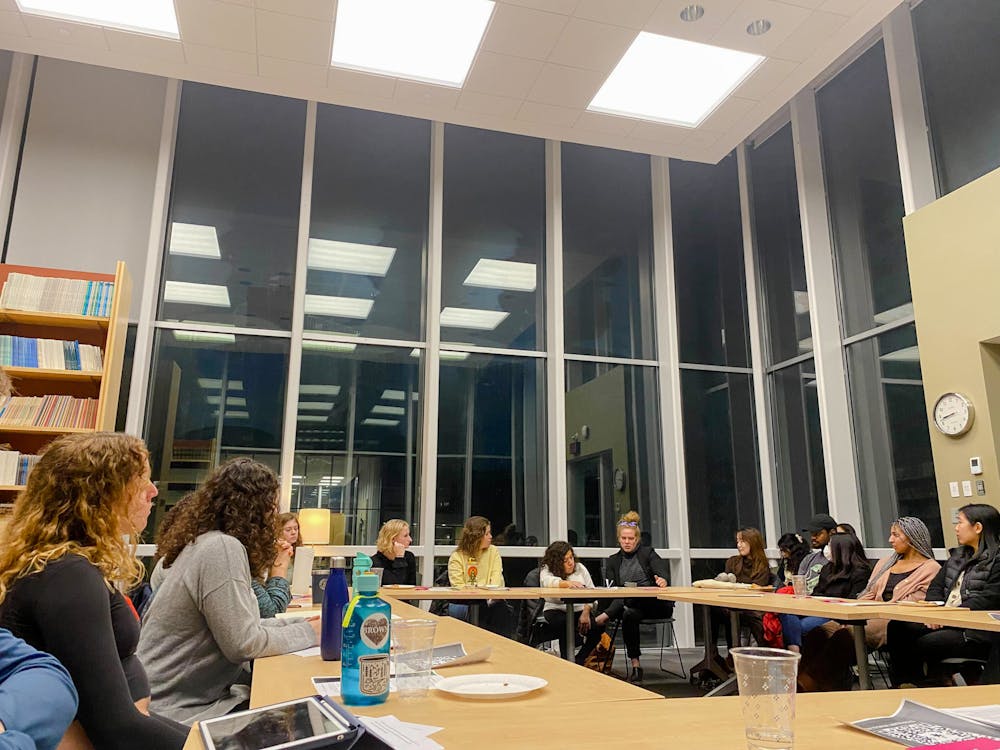Several student clubs sponsored a conversation with two Rhode Island representatives centered around identifying local avenues for protecting abortion access on Wednesday at the Watson Institute for International and Public Affairs.
Rhode Island State Senator Bridget Valverde and Rhode Island State Representative and Adjunct Assistant Professor of Health Services, Policy and Practice Rebecca Kislak ’95 discussed the importance of maintaining access to abortion and reproductive healthcare for all Rhode Islanders, particularly those from marginalized backgrounds.
The panel was organized by Planned Parenthood Advocates, Brown ACLU, Period Equity @ Brown, Saving Mothers, Women’s Health Advocacy Group and Circle of Women. Alex Lehman ’24, a member of Planned Parenthood Advocates and Circle of Women, introduced the speakers and moderated the event.
Valverde opened the talk with an overview of the current abortion access landscape in Rhode Island, explaining that although the Supreme Court ruled against a constitutional right to abortion this May, abortion is legal and protected in Rhode Island.
In 2019, Rhode Island enacted the Equality in Abortion Coverage Act to protect abortion access and repeal preexisting abortion restrictions, The Herald previously reported. Both Kislak and Valverde explained the implications of the EACA, which made coverage for abortion in state employee health plans, state Medicaid programs and related plans a requirement.
Many other states, including Massachusetts, mandate parental consent for abortions for people 16 years or younger. But Rhode Island residents up to the age of 18 still need parental consent to receive an abortion. “We are an outlier here. You could go off to college at 17 and still need your parent’s permission,” Valverde said. “That’s just crazy.”
Jocelyn Foye, executive director of The Womxn Project, a nonprofit that advocates for reproductive justice in Rhode Island, attended the discussion as well. She mentioned the importance of getting involved in Sista Fire, an organization rooted in helping Black women and Black queer people advocate against racism, sexism, homophobia and classism.
Valverde said that conversations with advocates, constituents and the people she represents motivate her to continue fighting, despite facing roadblocks to protecting abortion access.
Kislak emphasized how reproductive rights have impacted her life. “My right to get an abortion and my right to birth control has really shaped what I’ve been able to do in the world and I think more and more people are realizing that and talking about it,” she said. Kislak said that it is often hard to expect people who are low-income or possibly working two to three jobs to take on the additional burden of fighting for justice.
She noted that the R.I. General Assembly should work to center policies around the people they most affect, who are usually members of marginalized communities.
Kislak also voiced concern regarding the reinvigoration of federalism around reproductive rights, explaining that national bodies like the Supreme Court are leaving policy decisions up to individual states. “It’s terrifying and it’s not just abortion,” she said, suggesting that other rights — such as same-sex marriage or birth control — could be at risk of no longer being constitutionally guaranteed and instead handed back to the states.
Justice Clarence Thomas’s concurring opinion in Dobbs v. Jackson Women’s Health Organization listed prior Supreme Court cases dealing with privacy rights, birth control and same-sex marriage as potential decisions to also reconsider. The U.S. Senate recently passed a bill codifying same-sex marriage, which is expected to reach the House of Representatives for a vote in the coming weeks.
Kislak and Valverde explained that there are many opportunities and avenues to become involved in reproductive rights advocacy, especially for students in Rhode Island. Valverde mentioned that Rhode Island representatives are always looking for help on campaigns and are more than willing to teach students about how to become involved in these issues through campaigning.
Grace Holleb was a University News editor covering academics and advising.





